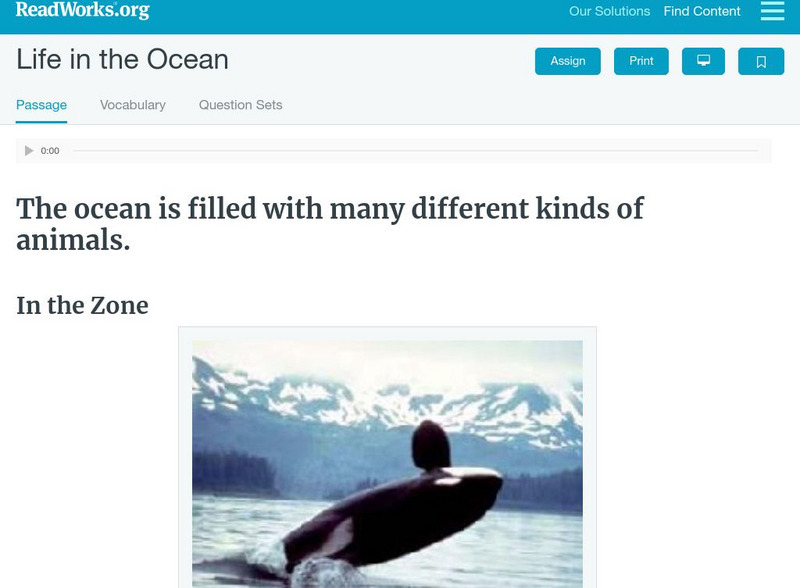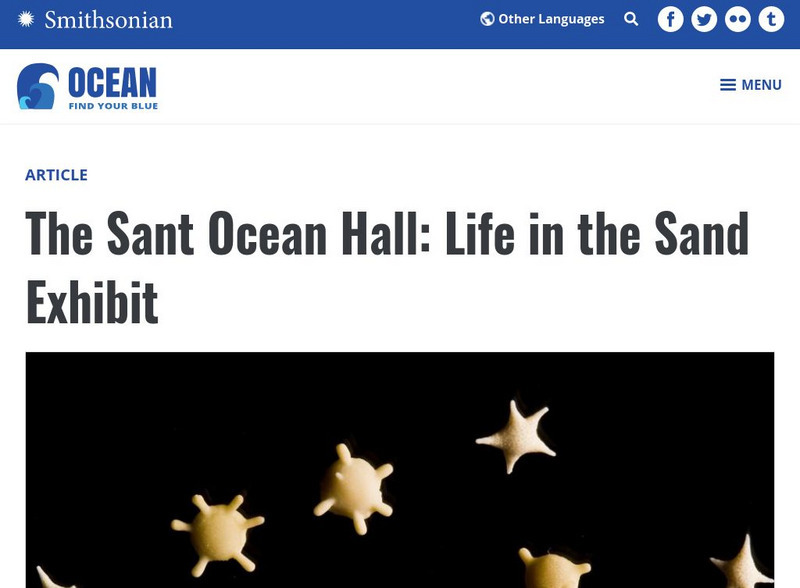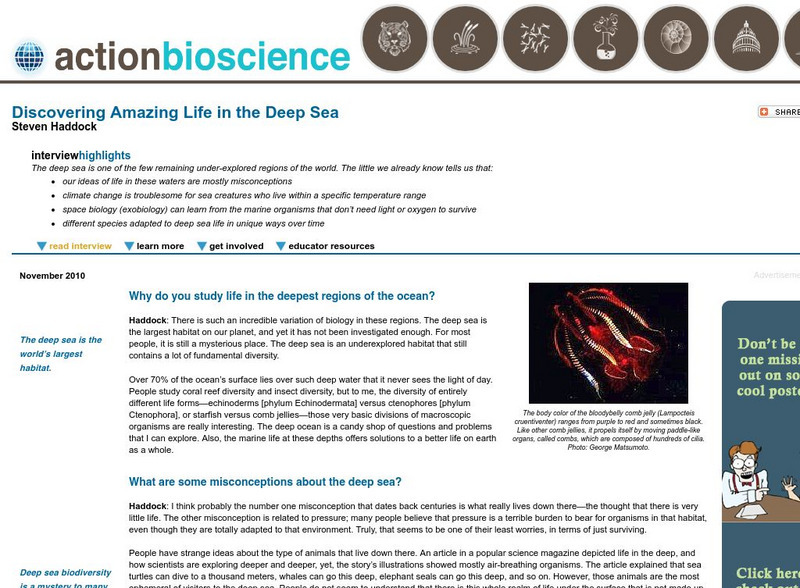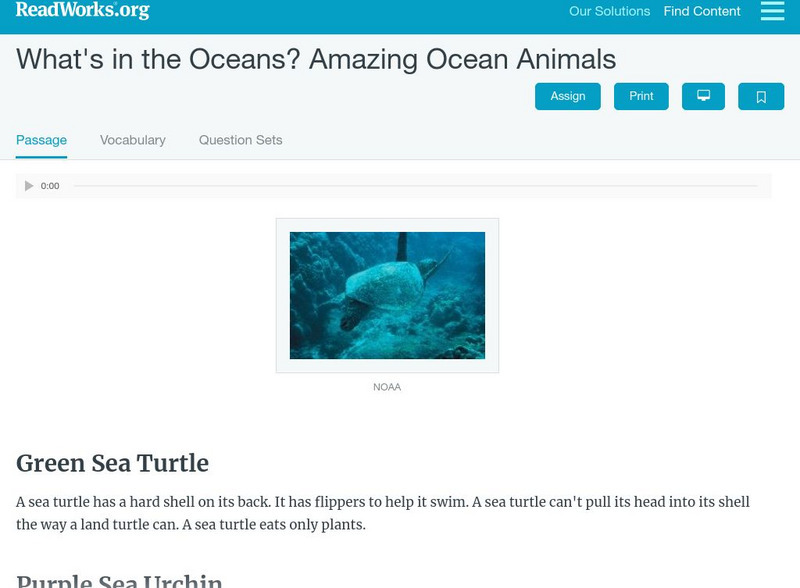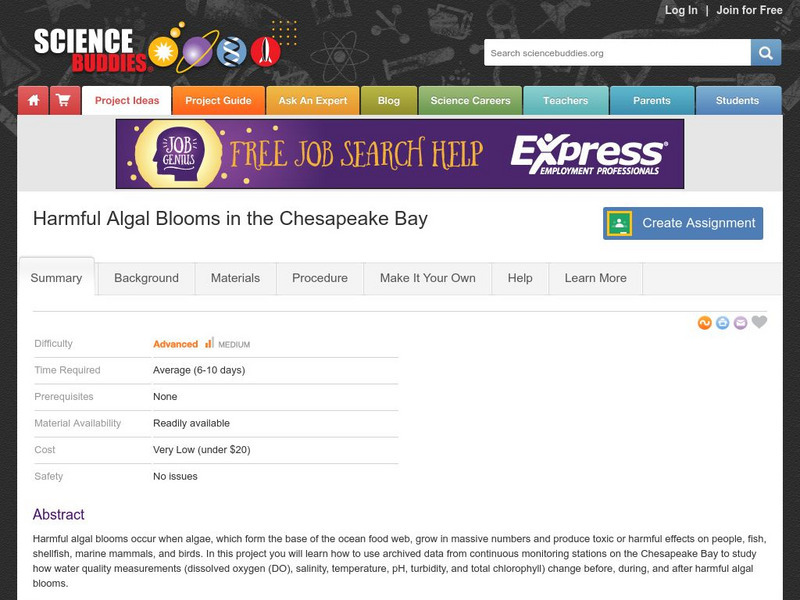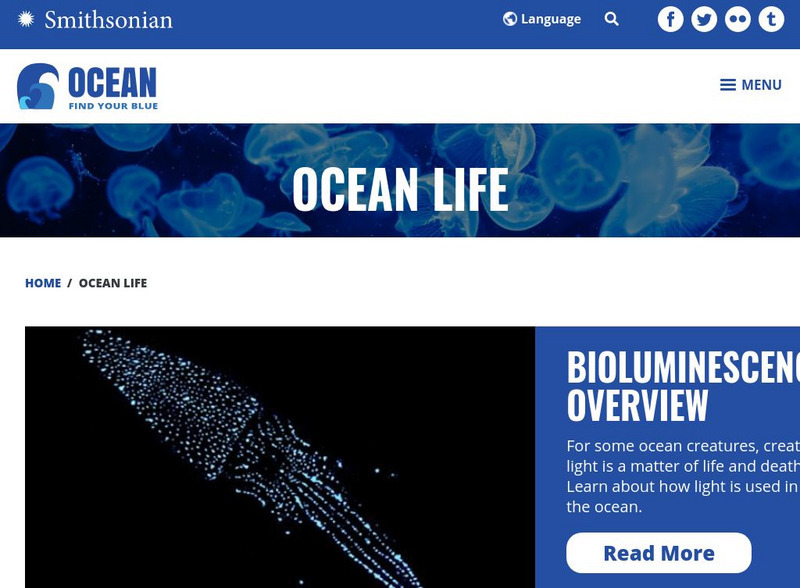Hi, what do you want to do?
Read Works
Read Works: Life in the Ocean
[Free Registration/Login Required] An informational text about the different depth levels of the ocean and the types of animals that live in each. A question sheet is available to help students build skills in reading comprehension.
Smithsonian Institution
Smithsonian Learning Lab: Contrasts in Blue: Life on the Caribbean Coral Reef and the Rocky Coast of Maine
Smithsonian Education presents Contrasts in Blue: Life on the Caribbean Coral Reef and the Rocky Coast of Maine. Teachers can download this comprehensive teaching package in which students explore two marine ecosystems, the coral reefs...
Smithsonian Institution
National Museum of Natural History: Ocean Portal: Life in the Sand
This article is the companion to the exhibit on Oceans at the Smithsonian. There is good information about sand, microscopic life in the sand, and problems that people cause on our beaches.
American Museum of Natural History
American Museum of Natural History: O Logy: Marine Biology
Learn about marine biology, life in the ocean. It defines marine biology and provides links to games, stories, videos, and hands-on activities on the topic.
National Geographic
National Geographic: Human Impacts on Marine Species
Students learn about three examples of human impacts on marine life: migration patterns and shipping, algal blooms and water chemistry, and marine debris. Some of these impacts are due to human activity in the ocean, and some impacts on...
Unite for Literacy
Unite for Literacy: Animals: Who Is in the Ocean?
A riddle book about ocean animals. Includes audio narration in 17 additional languages with text in English.
PBS
Pbs.org: Splash & Bubbles: Marine Biology & Social Emotional Learning for Your Classroom
Through play and exploration, Splash and Bubbles demonstrates and celebrates the amazing diversity of life in the ocean, building awareness and appreciation among its young viewers. All the while, viewers are exposed to concepts of...
American Museum of Natural History
American Museum of Natural History: Glowing in the Ocean
This site focuses on underwater animals that create their own light using bioluminescence. It also provides the lyrics and audio of a catchy tune putting bioluminescence in the spotlight.
NOAA
Noaa: The Ocean Drugstore [Pdf]
Learn how organisms living in the oceans may help people cure diseases. Create a poster to display what you learn.
National Geographic
National Geographic: Ecosystem Imbalance in the World
In this lesson, students build on their knowledge of individual impacts on the ocean to see how the whole system can react to threats and changes. They examine ways in which human actions throw marine ecosystems out of balance, explore...
American Institute of Biological Sciences
Action Bioscience: Discovering Amazing Life in the Deep Sea
A research biologist at the Monterey Aquarium and a professor at UC-Santa Cruz is interviewed to explain the studies done in the deep sea. Steven Haddock addresses the purpose of uncovering the mysteries of life and environment lying out...
Alabama Learning Exchange
Alex: Diverse Life Forms of the Ocean
This activity allows students to view and draw conclusions on the importance of life in the ocean. It uses student created movies to explore what is going on, as well as identifying the zones and diverse life associated with the oceans....
Read Works
Read Works: What's in the Oceans? Amazing Ocean Animals
[Free Registration/Login Required] An informational text about some of the animals found in the ocean including: sea turtles, sea urchins, starfish, sea horses, and clownfish. A question sheet is available to help students build skills...
Smithsonian Institution
National Museum of Natural History: Ocean Planet
Detailed website that was a companion to a 1995 traveling exhibit of the Smithsonian. Links to lesson plans and other educational materials are at the bottom of the page. Enter the exhibition to explore the world of the ocean.
Science Buddies
Science Buddies: Swimming in Acid: Understanding Ocean Acidification
The oceans are a precious natural resource, part of Earth's carbon cycle. But what happens if the oceans absorb too much carbon dioxide? Many scientists are concerned that the increased absorption of carbon dioxide is causing them to...
Science Struck
Science Struck: Decomposers in the Ocean: Role and Examples
Describes five different types of decomposers that feed on decaying organic matter in the oceans and that are at the bottom of the ocean food chain.
Science Buddies
Science Buddies: Harmful Algal Blooms in the Chesapeake Bay
Harmful algal blooms occur when algae, which form the base of the ocean food web, grow in massive numbers and produce toxic or harmful effects on people, fish, shellfish, marine mammals, and birds. In this project you will learn how to...
Society for Science and the Public
Science News for Students: Motion in the Ocean
This article reports on recent research that explains why corals are in nearly constant motion. Includes a brief video. [0:16]
Nature Conservancy
The Nature Conservancy: Coral Reefs of Palau: Nature's Amazing Underwater Cities
This lesson takes students on a virtual field trip to the coral reefs of Palau where they will explore amazing underwater cities found near a remote network of islands in the Pacific Ocean. Learn all about an ecosystem of symbiosis....
TED Talks
Ted: Ted Ed: 7 Things We Don't Know About the Ocean
The ocean covers 70% of the planet, but humans still don't know very much about it. In this video, Hank Green from SciShow discusses seven mysterious ocean topics. [10:31]
NOAA
Noaa: International Year of the Ocean: Pacific Coral Reef
"This [online] coral book was created to provide the reader with an introduction to the Pacific's fascinating coral reef ecosystem." The resource is for young students learning about life under the sea. Translated in English, Hawaiian...
TED Talks
Ted: Ted Ed: The Otherworldly Creatures in the Ocean's Deepest Depths
Although the deep ocean zone seems like an inhospitable and remote corner of the planet, it is actually one of the greatest habitats on Earth. Lidia Lins explores how so many species thrive in this mysterious underwater world. [5:02]
Smithsonian Institution
National Museum of Natural History: Ocean Portal: Ocean Life & Ecosystems
From the tiny to the titanic, from the familiar to the undiscovered, the ocean offers a stunning diversity of marine life and nearly every kind of habitat imaginable. Dive in and explore them here. Links incude stories, videos and photos...
Georgia Department of Education
Ga Virtual Learning: Marine Invertebrates
Students learn about invertebrates found in the ocean, their individual methods of adaptations, identifying characteristics, and contributions to the marine ecosystem.





